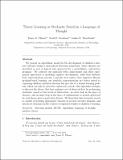Theory learning as stochastic search in the language of thought
Author(s)
Goodman, Noah D.; Tenenbaum, Joshua B.; Ullman, Tomer David
DownloadTenenbaum_Theory Learning as stochastic.pdf (2.512Mb)
PUBLISHER_CC
Publisher with Creative Commons License
Creative Commons Attribution
Terms of use
Metadata
Show full item recordAbstract
We present an algorithmic model for the development of children's intuitive theories within a hierarchical Bayesian framework, where theories are described as sets of logical laws generated by a probabilistic context-free grammar. We contrast our approach with connectionist and other emergentist approaches to modeling cognitive development. While their subsymbolic representations provide a smooth error surface that supports efficient gradient-based learning, our symbolic representations are better suited to capturing children's intuitive theories but give rise to a harder learning problem, which can only be solved by exploratory search. Our algorithm attempts to discover the theory that best explains a set of observed data by performing stochastic search at two levels of abstraction: an outer loop in the space of theories and an inner loop in the space of explanations or models generated by each theory given a particular dataset. We show that this stochastic search is capable of learning appropriate theories in several everyday domains and discuss its dynamics in the context of empirical studies of children's learning.
Date issued
2012-08Department
Massachusetts Institute of Technology. Department of Brain and Cognitive SciencesJournal
Cognitive Development
Publisher
Elsevier
Citation
Ullman, Tomer D., Noah D. Goodman, and Joshua B. Tenenbaum. “Theory Learning as Stochastic Search in the Language of Thought.” Cognitive Development 27, no. 4 (October 2012): 455–480.
Version: Author's final manuscript
ISSN
08852014